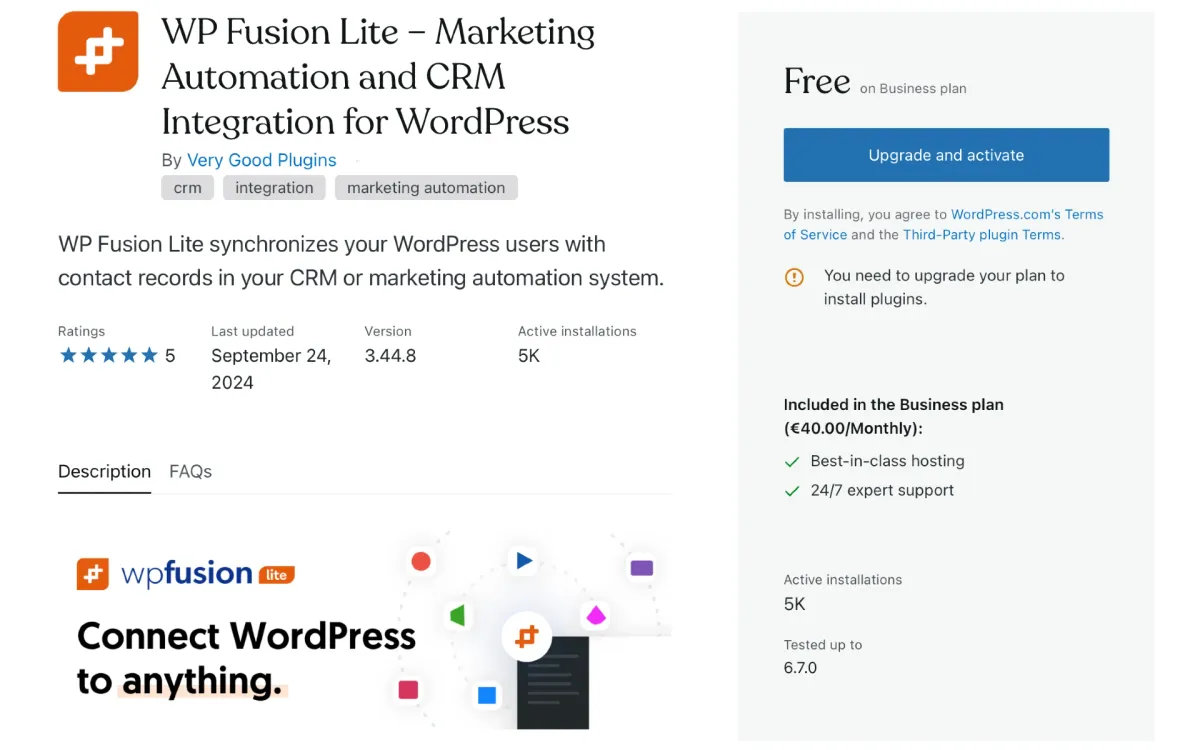
On October 5, 2024, Jack Arturo, founder of Very Good Plugins LLC, filed a cease and desist letter against Automattic Inc. and WordPress.com over alleged trademark infringement related to the WP Fusion plugin. The dispute centers around Automattic's hosting and distribution of a plugin titled "WP Fusion Lite" on the WordPress.com platform.
WP Fusion is a popular WordPress plugin that integrates customer relationship management (CRM) and marketing automation tools with WordPress websites. According to the WP Fusion website, the plugin has over 5,000 active installations and supports integration with over 50 CRM and marketing platforms.
Jack Arturo owns the federally registered trademark for WP FUSION (U.S. Registration No. 6,052,437), which was registered on May 12, 2020. The trademark is associated with software services including website integration with customer relationship management and marketing automation systems.
In the cease and desist letter, Arturo alleges that Automattic's hosting of the "WP Fusion Lite" plugin on WordPress.com constitutes trademark infringement. He claims this creates "a likelihood of confusion, mistake, or deception regarding the source, sponsorship, or affiliation of the WP Fusion brand."
Details of the Cease and Desist Letter
The cease and desist letter, addressed to Automattic's legal department, makes several key demands:
- Immediate removal of the "WP Fusion Lite" plugin from WordPress.com
- Refraining from using or permitting the use of any trademark, logo, or name confusingly similar to WP Fusion
- Providing written confirmation within 10 business days that these actions have been taken
Arturo states in the letter that failure to comply will result in pursuing "all available legal remedies, including but not limited to seeking injunctive relief, damages, and attorney's fees for trademark infringement."
WordPress.com and Plugin Distribution
WordPress.com, owned by Automattic, is a popular managed WordPress hosting platform. Unlike self-hosted WordPress sites, WordPress.com restricts plugin installation on most of its plans. However, users on Business and higher tier plans can install plugins from a curated directory.
According to WordPress.com's plugin directory, WP Fusion Lite is listed as having over 5,000 active installations. The plugin description states it is a free version that "synchronizes your registered WordPress users with your connected CRM, including their name and email address."
Legal Considerations Around WordPress Plugins
The dispute raises interesting legal questions about plugin distribution and trademark rights in the WordPress ecosystem. WordPress itself is open-source software released under the GPL (GNU General Public License). Most WordPress plugins are also released under GPL-compatible licenses.
However, trademark law operates separately from copyright and open-source licensing. Even if the underlying code is open-source, companies and developers can still claim trademark rights to names and branding associated with their plugins.
According to the WordPress Foundation Trademark Policy, while WordPress itself is a trademark, plugin developers are generally free to use "WordPress" in their plugin names (e.g. "WordPress SEO Plugin"). But the policy also states that plugin authors should not use trademarks in a way that suggests endorsement by or affiliation with WordPress.
Industry reactions
The cease and desist letter has sparked discussion in the WordPress developer community. Some see it as an overreach, arguing that "Lite" versions of plugins are common practice. Others view it as a legitimate defense of trademark rights by a small business against a larger corporation.
Mike Gillihan, founder of CauseLabs, tweeted: "Riddle me this… @photomatt there's the accusation of trademark violation by @wpengine which IMO seems loose at best, but ok. What do we call .com's fork of the plugin repo that requires a paid plan to leverage?"
Angela Bowman, a WordPress consultant, tweeted in response: "Mike, anyone can host all of these GPL plugins. No one is stopping anyone from doing that. A8C OWNS the commercial TM for WordPress and also MM owns wordpress dot org. All within his rights."
The dispute also highlights ongoing tensions between WordPress.com (owned by Automattic) and the broader WordPress ecosystem. Some developers have criticized Automattic for leveraging its position as a major contributor to WordPress to gain competitive advantages for WordPress.com.
Potential impacts and precedents
The outcome of this dispute could have significant implications for plugin distribution and branding in the WordPress ecosystem. If Automattic complies with the cease and desist, it may set a precedent for stricter enforcement of plugin trademarks on WordPress.com and potentially other WordPress hosting platforms.
Conversely, if Automattic contests the claim, it could lead to a legal battle that further defines the boundaries of trademark rights for WordPress plugins. This could impact how hosting providers and plugin marketplaces approach the distribution of "lite" or forked versions of premium plugins.
For plugin developers, the dispute underscores the importance of understanding and protecting their intellectual property rights, including trademarks. It also highlights the complex interplay between open-source licensing, trademark law, and commercial interests in the WordPress ecosystem.
Next steps
As of October 13, 2024, Automattic has not publicly responded to the cease and desist letter. The company has until approximately October 19 to provide the written confirmation requested in Arturo's letter.
Interested parties in the WordPress community will be watching closely to see how this dispute unfolds and what precedents it may set for future plugin distribution and trademark enforcement.
Key Facts
- Jack Arturo filed a cease and desist letter against Automattic on October 5, 2024
- The dispute concerns alleged trademark infringement of the WP Fusion plugin
- WP Fusion has a registered trademark (U.S. Registration No. 6,052,437) from May 12, 2020
- The "WP Fusion Lite" plugin on WordPress.com has over 5,000 active installations
- Automattic has until approximately October 19, 2024 to respond to the cease and desist letter

